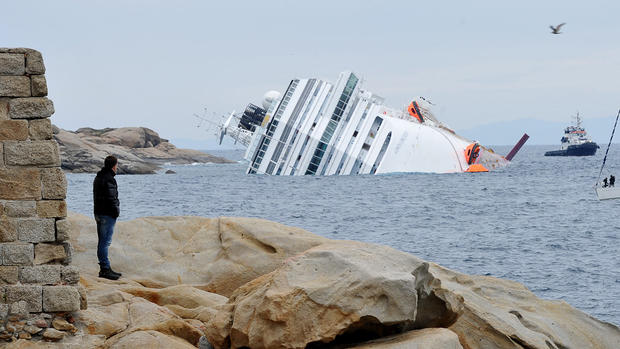First evidence hearing in Concordia wreck
(AP) GROSSETO, Italy - The first evidence hearing into the Jan. 13 shipwreck of the luxury cruise liner Costa Concordia began Saturday, with so many people determined to attend the session that it was held in a local theater instead of the courthouse.
Prosecutor Francesco Verusio cautioned that it could be some time before the results of evidence analysis are known. He told state radio it could be "a month, two months, three months," before findings, including of recorded conversations in the command room, are ready.
Lawyers for survivors, the dead and the missing, and some passengers themselves, crowded the closed-door hearing in the Tuscan city of Grosseto where the probe of the captain, several other ship officers and officials of the Costa Crociere SpA cruise company is being conducted.
Verusio said he expected the daylong hearing to be taken up by procedural battles, as the court formally assigns experts to analyze technical data from the ship's recorder and other evidence, including crucial recordings of conversations in the ship's command room.
Lawyers for the captain, Francesco Schettino — who is accused of manslaughter, causing a shipwreck and abandoning ship — slipped into the theater through a backdoor. Schettino, who is under house arrest in his home near Naples, denies wrongdoing and was not in attendance.
Findings would be used to help a judge determine if a trial is warranted.
Thirty-two people either died or are missing and presumed dead after the Concordia rammed into a reef near the island of Giglio during dinner hour on the Mediterranean cruise. The ship — with 4,200 passengers and crew aboard — quickly took on water after a rocky reef gashed a hole in the side of its hull, then capsized near Giglio's port.
Prosecutors say the captain steered the ship too close to the island to show off the vessel to islanders in a publicity stunt. Schettino has claimed that the reef, which appears on many tourist maps, wasn't on his navigational charts.
Italian law allows injured parties to attach civil lawsuits to criminal cases, and they or their lawyers are permitted to attend hearings closed to the general public and media.
Among those entering the theater was survivor Sergio Ammarota, who said he was curious to see what would be learned when the so-called "black box" data recorder is opened and analyzed.
Ammarota said he wanted to know "exactly how it (the crash) happened and why the captain ... could have carried out such a maneuver."
Schettino is accused of abandoning ship while many passengers and crew were still aboard, and struggling to escape. Some of the passengers and crew jumped into the water and swam to shore after the Concordia's tilt made it impossible to lower all the life boats.
The conversations among Schettino and his officers, and with Italian Coast Guard officials, are crucial in determining what happened, and why the captain initially told the Coast Guard that there was a blackout onboard and didn't mention the collision.
Some conversations have already been made public, including one, played over and over again on Italian TV, in which a Coast Guard official based in Livorno, on the mainland, repeatedly orders a reluctant Schettino to get back on his ship and direct the evacuation and rescue efforts.
Among those present pressing lawsuits at the hearing Saturday was the Italian cruise company itself.
"We are an injured party, we lost a ship," Marco De Luca, a lawyer for Costa Crociere said.
Participants acknowledged as they arrived that the search for truth and justice will be a long one.
"Today is just the beginning," said Francesco Compagna, a lawyer for some passengers and an injured Russian crew member, Irina Nazarova.
"It is the first day. We don't expect quick things but we think that the investigation must follow in all the directions."
Compagna added that the legal team is "working hard to show that it was not the first time that the Costa boats used to go very close to the island." He claimed to have documents to indicate the Concordia, on a previous voyage on the same route in August, was very close to the port.
Costa Crociere officials have acknowledged one previous close maneuver, but denied their ships regularly steered close to shore in publicity-drawing maneuvers.
One of the lawyers representing passengers — Giuseppe Grammatico — is also a survivor. Grammatico told reporters that some passengers, including himself, siezed the initiative to be evacuated because orders weren't forthcoming from the ship's officials.
"Just think, our lifeboat was lowered into the water because we insisted that it be done without an order from the captain," Grammatico said.
Among those attending were relatives of some of the missing in the accident, including a French woman, Mylene Litzler.
Costa Crociere again came under the spotlight earlier in the week when a fire broke out in the generator room of the Costa Allegra, leaving the cruise ship without power and adrift in waters known to be prowled by pirates in the Indian Ocean. The ship arrived in the Seychelles after three days under tow. There were no injuries.

